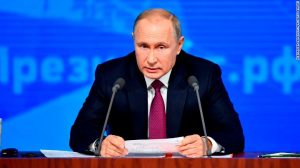
In a televised address on Monday, Russian President Vladimir Putin denounced the weekend uprising as the work of “enemies of Russia and neo-Nazis.” He emphasized the importance of national unity in swiftly putting an end to the coup attempt led by Yevgeny Prigozhin, the founder of the mercenary group known as the Wagner Group.
During his five-minute speech, Putin praised Russian patriotism as the driving force behind the successful suppression of the rebellion, stating that it would have been quelled regardless of its duration. He expressed gratitude towards military personnel, law enforcement officers, and special servicemen for their unwavering commitment to duty, oath, and the Russian people. This marked Putin’s first appearance since the conclusion of the uprising, and he acknowledged the decisive action taken by Russian society in overcoming this challenging situation.
Putin also acknowledged the majority of the mercenaries for preventing a descent into bloodshed, attributing the blame primarily to Prigozhin, his former ally who accepted an agreement to flee to Belarus. While Putin recognized the Wagner group’s efforts in the Donbass and Novorossiya regions, he portrayed many of the fighters and commanders as loyal Russians who were misled.
Meanwhile, Prigozhin issued his first statement since the failed march on Moscow, explaining that he halted the campaign to avoid shedding Russian blood and clarifying that the objective was to protest, not to overthrow the regime. He denied responsibility for the deaths of numerous pilots and other Russians, claiming that his troops were attacked. Prigozhin asserted that if Russian forces had advanced into Ukraine as far as his Wagner troops did in 24 hours, the 16-month-long war would have ended within a day.
The march orchestrated by Prigozhin began on Friday and concluded the following day with a deal brokered by Belarus President Alexander Lukashenko. Under the agreement, Prigozhin would seek refuge in Belarus, and neither he nor his troops would face charges of treason. However, sources within the prosecutor general’s office, as cited by Russia’s RIA Novosti state news agency, suggested that the criminal case against Prigozhin remains open.
Prigozhin and his estimated 50,000-strong mercenary troops have played a pivotal role in Russia’s territorial ambitions in the contentious Donbas region of Ukraine. Prigozhin has repeatedly criticized Russia’s military leaders, accusing them of inadequate support and the underperformance of regular troops.

ByteDance Refuses TikTok Sale Despite US Pressure, Plans Legal Challenge
Harvey Weinstein’s Rape Conviction Overturned, Paving Way For New Trial
Biden Administration Imposes New Sanctions On Iran Following Attack On Israel
Israel’s European Allies Urge Restraint Amid Escalating Tensions With Iran